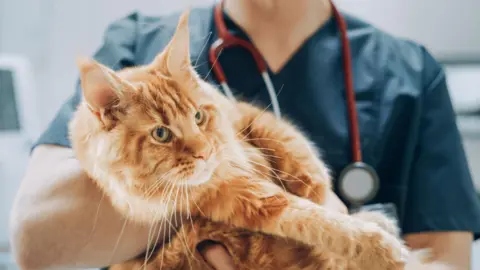Vet prescription fees could be capped by watchdog
 Getty Images
Getty ImagesA cap on vets' prescription fees is one of the measures being considered by the UK's competition body as it investigates the sector.
The Competition and Markets Authority (CMA) is forging ahead with a formal probe of the vets market amid concerns that pet owners are overpaying for treatments.
It said it had heard from people who were struggling to pay vet bills and did not always know the best treatment options for their pets.
The British Veterinary Association said regulation of the sector was "woefully out of date" as it welcomed the review.
The CMA said estimates suggest that as many as 16 million households in the UK have at least one pet.
It said the Office for National Statistics has estimated that the cost of veterinary and other pet services has increased by around 50% since 2015, much higher than the overall rate of inflation.
The watchdog launched a review last year to ask people if they had any concerns that they could be paying too much, and received 56,000 responses from pet owners, vets and charities.
Earlier this year it flagged concerns that pet owners might not be getting basic information like price lists online and were not always informed of the cost of treatment at a vets before agreeing to it.
The CMA is now launching a formal investigation, which means it could intervene directly in the market.
The regulator outlined three tips for pet owners when looking for treatments:
- Look further than the closest vet as fees and services differ between practices
- Ask if there are other treatment options
- If the treatment is not urgent, consider buying medication elsewhere such as an online pharmacy or specialist pet shop
“The message from our vets work so far has been loud and clear – many pet owners and professionals have concerns that need further investigation," said Sarah Cardell, the CMA's chief executive.
“We’ve heard from people who are struggling to pay vet bills, potentially overpaying for medicines and don’t always know the best treatment options available to them," she said.
The CMA said local vet services are worth £2bn-£2.5bn a year, but when other aspects such as cremation, specialist treatments and medicines are taken into account, the overall value of the industry is estimated at £5.7bn a year.
The competition body highlighted how the sector was increasingly being dominated by larger firms and how this might be reducing consumer choice
There are about 5,000 vet practices in the UK, it said, but since 2013, approximately 1,500 of these have been acquired by six large corporate groups.
They are CVS, Independent Vetcare Ltd, Linnaeus, Medivet, Pets at Home and VetPartners.
Four of these six tend to retain the name and branding of an independently-owned practice when they buy it, which the CMA said may create an "illusion of competition" for consumers if they are trying to shop around to find alternative practices.
 Getty Images
Getty ImagesThe watchdog said the inquiry would look at:
- Whether consumers were getting the right information to make informed decisions
- If a limited choice of vets in some areas was affecting pet owners
- The level of profits earned by vet businesses
- Whether vet businesses have the incentive and ability to limit consumer choice when providing treatments or services
- Whether the regulation of the market needs changing
It said possible remedies could include forcing firms to provide certain information to consumers, imposing maximum prescription fees, and ordering the sale or break-up of businesses.
Malcolm Morley, the British Veterinary Association's (BVA) senior vice president, told the BBC's Today programme that the trade body was "very keen" on the inquiry and it had been working closely with CMA in recent months.
"Some of the points the CMA raises are things that we’ve been raising for a long time," he said.
"The regulation of vets and veterinary practices is woefully out of date, not fit for purpose."
Mr Morley added that the area of buying treatments online also needed looking at.
He said many independent vet practices were forced to buy medicines from wholesalers at prices that were higher than those consumers face when they buy from an online pharmacy.
Gemma Attenborrow, a dog owner from Birmingham, told the BBC she spent almost £10,000 on spinal surgery for her French bulldog Bali.
She said she felt she was charged an "extreme amount" for average service.
Ms Attenborrow said pet owners may be too scared to go the vets because of large bills and that it's "unfair" for the animals as well as owners.
Abuse of vets
The CMA also, however, heard from vets who said they sometimes faced abuse from pet owners over what they considered to be high fees.
While they acknowledged that fees have risen, they also said interactions with pet owners were also influenced by factors such as:
- Owners "not understanding the true cost of veterinary care", partly due to people comparing it to NHS treatment, which is free at the point of use
- Many new, inexperienced pet owners since the pandemic
- pet owners not having insurance
- TV vet programmes raising expectations "where costs are rarely, if ever, discussed".
BVA president Dr Anna Judson said: "Since the CMA first announced their review, vet teams in practice have found themselves on the end of really unpleasant, often abusive behaviour.
"This is unacceptable and we urge everyone to remember that vets are people and are often not responsible for the pricing structures within a practice."
